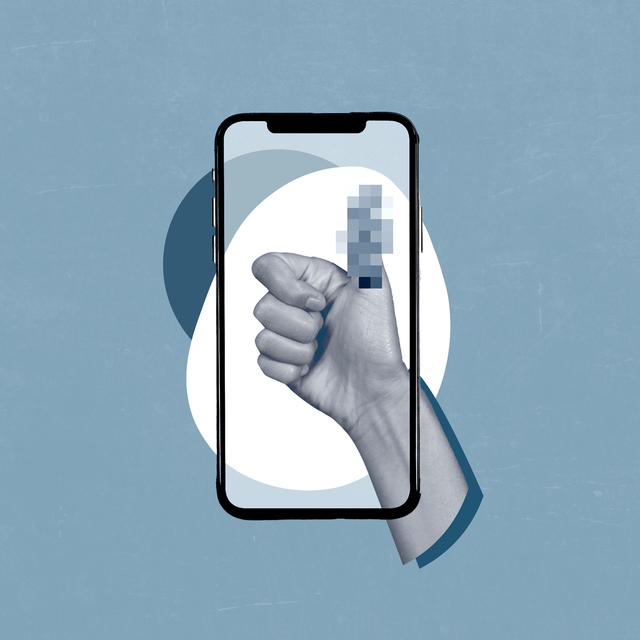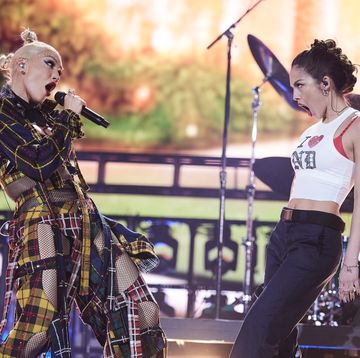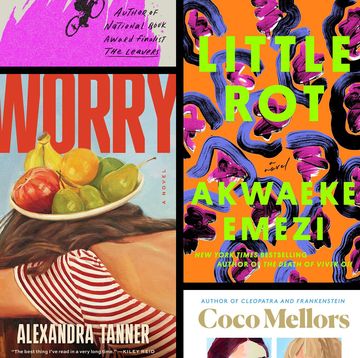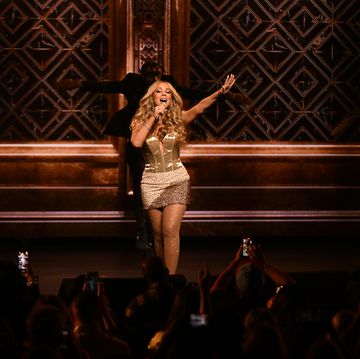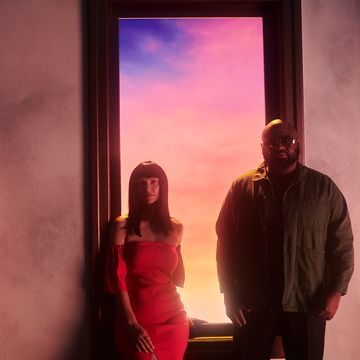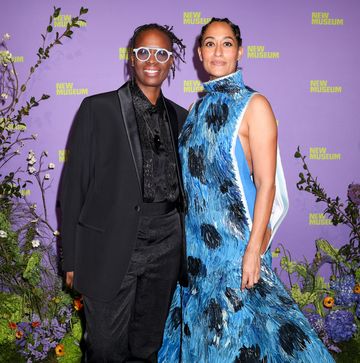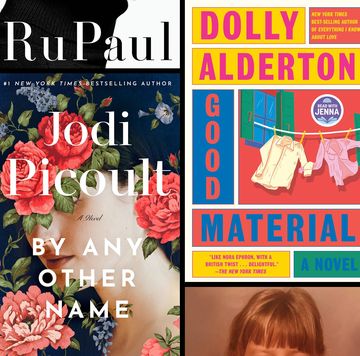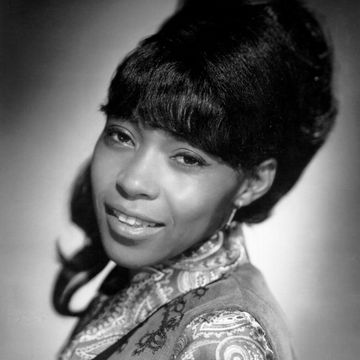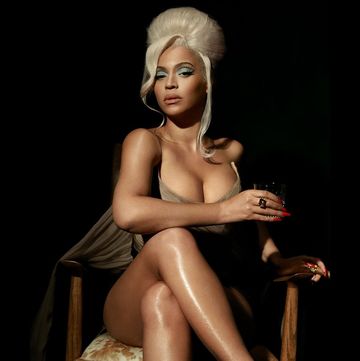If there’s one thing Bravo’s Real Housewives franchise is known for, it’s the ability to platform lowbrow discourse. Consider Luann de Lesseps and Dorinda Medley’s fight over the designer Jovani; Teresa Giudice’s feud with her sister-in-law, Melissa Gorga, about sprinkle cookies; the Sonja Morgan Tipsy Girl versus Bethenny Frankel Skinnygirl battle! Epic. Cast members (and the show’s editors) have turned the ability to make the most mundane fights into extraordinary, multi-episode-long events, all for loyal viewers to devour week after week. But it’s the latest fracas that has permeated the Housewives ether and ignited a larger, albeit no less tacky, cultural conversation. And it’s all because of this: 👍, the thumbs-up emoji, that this debate's lived rent free in our minds for weeks.
Let’s set the scene: The ladies of Salt Lake City, the 10th American Housewives franchise, are seated at a dinner. A prosaic fight erupts. Lisa Barlow (who considers herself “Mormon 2.0”) says to Heather Gay (a self-proclaimed “good Mormon gone bad”), “I have never done anything mean to you. And until you figure out what it is that I trigger in you, we can’t have a good solid conversation and move forward. Thumbs up. Fuck you, ”— a reference to a text exchange between the two that ended with Gay sending a pair of thumbs up emojis, which, according to an insulted Barlow, is “universal text code” for fuck you.
But wait. Am I the crazy one? Here I thought the middle finger emoji was the clearest way to tell a person to go fuck themselves. Have I been telling my friends, loved ones, even my therapist to go fuck themselves for years? Or am I in the clear, having not added the second thumbs up? Is there any basis to this whatsoever?
At this point, feeling insane and in search of clarity, I decide to call up Heather Gay. (I might have texted had I not feared the conversation devolving into uninterpretable emoji speak.)
“Listen, when I sent the thumbs up, I was not meaning it to be aggressive-aggressive,” she says. “I meant for it to read as, ‘Message received and I’m done with this conversation’ … which, in hindsight, really did mean an eff you. It was nebulous enough and passive-aggressive, and she was perceptive enough to pick up on that.”
Okay, but what about the double emoji thumbs up? Is there a universality of understanding among ex-Mormons, Salt Lakers, and Real Housewives that my brain is not privy to? “In my heart and mind, and amongst my friends, there was a universal text code that if you sent two thumbs up, it was F and U, but a nonaggressive way of doing it versus an exclamation point on a message,” explains Gay.
When I point to the existence of the middle finger emoji, she breezily shrugs it off. “Where is the fun in that? I want to have a rainbow of communicative nuances and subtitles with my emojis. It’s become a language, and with every language, there’s double entendres, there’s nuances. I think we should be talking about the characters of the emoji alphabet, what they really mean, and how they are used as weapons against us.”
*Very Wendy Willams voice* she’s got a point.
I also call up an emoji expert to weigh in. Mark Bramhill, a podcast producer and host of Welcome to Macintosh, has devoted multiple episodes to uncovering where emojis come from, how they are designed, and how they come to have meaning. Bramhill, who has never seen a single episode of any Real Housewives (couldn’t be me 🥺), has never heard of the single or double thumbs up being used as a fuck you, but he doesn’t dismiss the interpretation.
“If Gay thought that Barlow was mad at her when she got the text, opening the message assuming it would be passive-aggressive, I totally understand how Gay might feel offended by ‘👍👍.’ In the same way someone can sarcastically say ‘great job’ when you’ve just spilled red wine on a white couch, emoji can be used insincerely—and that’s really hard to be sure about.” Bramhill also recognizes the ways in which gestures can have different meanings across cultures. According to Roger E. Axtell’s book Gestures: The Do’s and Taboos of Body Language Around the World, Russia, Australia, Iran, Greece, and Sardinia interpret the thumbs up symbol to mean “up yours.”
Emojis aren’t just a shorthand; they afford us the ability to convey tone, emotion, even playfulness while also providing a clarity and reassurance to text that might otherwise be read as ambiguous. Notes Bramhill, this also introduces new kinds of confusion, as was the case of Barlow v. Gay. “Say someone with an iPhone is texting someone with a Google Pixel. Apple has their emoji font, Google has theirs, and they generally line up, but in some cases, the differences are really important. Back in 2016, Apple changed their version of ‘pistol’ to be a water pistol, rather than a revolver. But Apple was the only one to change this at the time, so if an iPhone user texted someone using an Android phone, the cute toy would have a very different meaning. Over time, everyone’s emoji sets have converged towards a given emoji’s most popular use—the pistol is now a water pistol on pretty much every platform—but there are still plenty of opportunities for confusion.”
Then there’s a number of emojis that lack clear meaning. This misunderstood gem, 🙆♀️, is actually Woman Gesturing OK (the intention is an “OK” sign in Japan), but many Americans might see this more as Natalie Portman in Black Swan. Then there’s my beloved 🥴 (officially called Face with Uneven Eyes and Wavy Mouth), which looks very different across multiple platforms and lacks any universally understood meaning—which might, in fact, explain its popularity. And, of course, there’s the peach emoji, 🍑, which can be seen as a Call Me by Your Name homage, a reference to the state of Georgia…or just someone’s tush!
This all to say, the thumbs up emoji (single or double) being sent as or inferred as a fuck you has some merit. “I feel bad that I’ve taken away a very innocuous emoji that was being used internationally and now I’ve loaded it and now it’s charged,” concludes Gay. And though she may not feel good about it, the welcome distraction of something as innocuous and random as the thumbs up emoji being this loaded of a debate makes us feel very grateful. Or, as some might say, 🙏.
